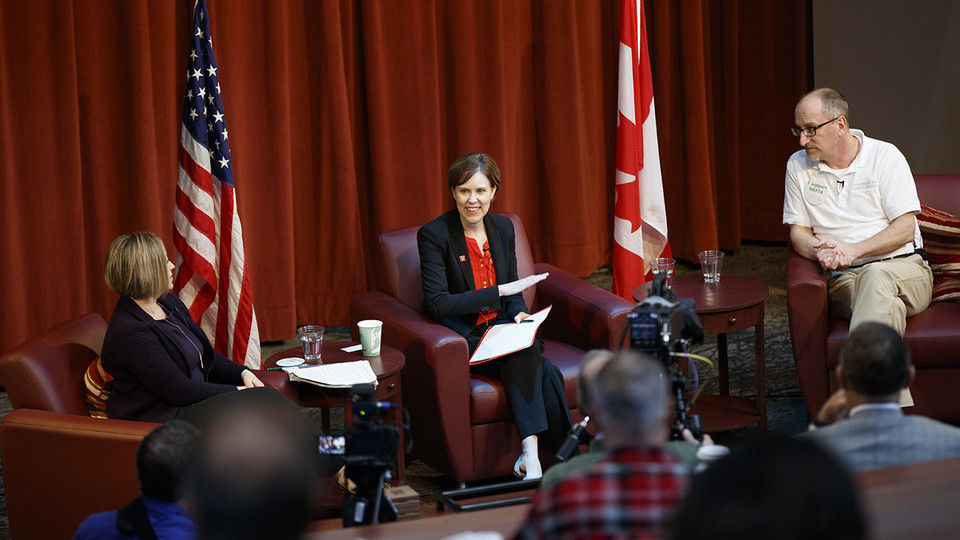Trade is an integral economic issue for rural Americans, but becoming informed can be difficult as trade has a language of its own.
To address this problem, the final University of Nebraska-Lincoln Heuermann Lecture of the 2017-18 season featured a panel discussion with two individuals who have created tools to allow people to become informed participants on trading systems and advocate on their own behalf.
Andrea Durkin, editor-in-chief of trade news and information website TradeVistas, and Brian Kuehl, executive director of nonprofit Farmers for Free Trade, served as panelists in the discussion, which was moderated by Ambassador Darci Vetter, diplomat in residence at the university.
The talk was held recently at Nebraska Innovation Campus in conjunction with the Yeutter Institute’s inaugural symposium, which was sponsored by CME Group Foundation.
“All of us, as consumers or farmers or small business people need to know what’s happening concerning trade and what that might mean for our practical decisions,” Vetter said.
Dunkirk said TradeVistas’ goal is to relate trade to daily life and communities and that by talking to people directly about trade policy and how it affects them, there is a strong level of interest in trade policy.
“I think the biggest challenge we have now is that we’ve gone trade blind. We inherently appreciate the benefits of free trade, but we don’t attribute those benefits to free trade,” Durkin said. “It’s time that we bring that back to the forefront and talk about the role that trade plays in our daily lives.”
Farmers for Free Trade can help farmers and ranchers bring their ideas to the table. Kuehl said it’s important for farmers and ranchers to stay actively learning about trade and advocating for policies that expand export opportunities for American farms and ranches.
“Trade is integral to U.S. agriculture, so it’s important to have an ongoing dialogue both when a trade agreement is up and when there’s nothing going on with trade,” Kuehl said. “As critically important as it is to explain why trade is important, we also need to give a voice to the farmers.”
Randon Peters, a fifth-generation farmer from McCook, is featured on the Farmers for Free Trade site in a video explaining about why trade is so critical. Peters is directly affected by trade policies because 50 percent of the wheat grown on his farm is exported to a foreign country.
Kuehl said he hopes the efforts of Farmers for Free Trade will encourage people to support trade to help farmers like Peters and others in rural America.
“Trade really does matter for our rural communities,” Kuehl said. “It matters for our main streets. It matters for our families.”
The Heuermann Lecture capped off the Yeutter Symposium, which featured discussions on global trade and international finance and how they influence diplomacy. The symposium featured a keynote presentation from Keira Lombardo, senior vice president of corporate affairs for Smithfield Foods. Lombardo offered a glimpse into how major agribusinesses address changing trade environments. Vetter was also part of a panel focused on how government officials negotiate trade. She was joined by Kirsten Hillman, deputy ambassador in Canada’s Embassy to the United States.
The symposium was the kickoff event for the university’s Clayton Yeutter Institute of International Trade and Finance, which is made possible by a $2.5 million leadership gift from renowned trade expert and Nebraska alumnus Clayton Yeutter and his wife, Cristy. The institute will prepare students to understand, participate in and shape global trade and finance in a world that is increasingly interconnected.
Heuermann Lectures are funded by a gift from B. Keith and Norma Heuermann of Phillips. The Heuermanns are longtime university supporters with a strong commitment to Nebraska’s production agriculture, natural resources, rural areas and people.
Lectures are streamed live at http://heuermannlectures.unl.edu and air live on campus channel 4. They are archived after the event and later air on NET2 World.
